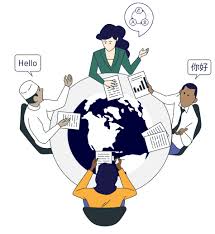The Role of Cultural Adaptation
Each language is a complex system with its own grammatical rules, idiomatic expressions, and cultural references. Beyond translation, a translator not only transfers information but also interprets and adapts the messages so that they are understandable in the context of the target language.
For more information on the complexities of translation, check out the American Translators Association website.
For specialized translation services, consider exploring our Translation from Spanish page.

Overcoming Cultural Differences in Translation
One of the biggest challenges in translation is cultural adaptation. Words and phrases carry different connotations depending on their context. Humor, for instance, varies greatly across cultures. What is amusing in one language may not resonate the same way in another or may even be offensive. A skilled translator must navigate these subtleties to faithfully convey the original intent without losing its impact.
Ensuring Precision in Legal and Medical Translation
The legal field is an example where accuracy in translation is essential. For example, an error in the interpretation of a term in a contract, treaty or legal document can have significant consequences. In the medical and scientific sector, an accurate translation can make the difference between life and death.
In the medical and scientific sector, an accurate translation can make the difference between life and death. Pharmaceutical translation is particularly critical, as a misinterpretation of a package leaflet, report or prescription can put patients’ health at risk. Therefore, documents such as package leaflets, clinical reports and research must be translated accurately to ensure that they are correctly understood. An error in the translation of a dosage or medical recommendation can have serious consequences, highlighting the need for specialised translators.
Translate has enabled great literary works to achieve international recognition. More than translating the story, translators capture the style and essence of the author. This process requires sensitivity, as every word influences the narrative. The translator’s choices can change the perception of the work without betraying its original spirit.
Business and technology
In the business world, the translation of documents, the correct localisation of content is key to a company’s expansion. Moreover, with digital globalisation, translate software, video games and websites is essential to ensure a smooth user experience.
Technological advancement has created new challenges in translation. With digital globalisation, localisation of software, video games and websites is key. More than converting text, it involves adapting the interface and user experience. Poor translation can cause confusion and affect trust in the product.
Artificial intelligence in translation: A future without translators?
Machine translations have advanced thanks to artificial intelligence. However, they still have limitations in interpreting context, irony and emotions. Therefore, although they can be useful for quick translations, human intervention remains indispensable to ensure accuracy and quality.
A Real-Time Challenge
Simultaneous interpretation plays a key role in international conferences, diplomatic meetings and multinational events. At such events, interpreters must process and transmit information in real time, ensuring that the message is accurate and understandable. Therefore, this type of interpretation requires high concentration, memory and fluency in both languages.
Research and education
The importance of good interpretation extends to the academic field. Indeed, research and knowledge advance thanks to the possibility of sharing information in different languages. Otherwise, knowledge would be restricted, limiting global progress. Moreover, in education, translation facilitates access to study materials and promotes learning between students from different countries.
Furthermore, in education facilitates access to study materials and resources in different languages. For this reason, many fundamental works in various disciplines would not be available to some students without accurate translations. Multilingual education and academic exchange programmes rely on translation to foster understanding and learning among students from different countries.
Translation in film and television
Dubbing and subtitling enable audiovisual productions to reach international audiences. In this context, fidelity to the original script and cultural adaptation are essential to the viewer’s experience. On the other hand, a translation error can change the meaning of a scene or generate confusion in the plot.
Translation in journalism and news dissemination
Journalism relies on translation to share information of global relevance. Especially in times of crisis or emergency, the translation of official communiqués can be vital for people’s safety. If not done correctly, a mistake in this context can cause misinformation and affect public perception of an event.
Translation in international organisations
Global institutions such as the UN, the EU and the WHO work with multiple official languages. For this reason, translate is key to ensuring international communication and cooperation. Without it, diplomacy would be seriously affected.
Tourism: Enhancing the traveller experience
Translation plays a fundamental role in the tourism industry. Indeed, correctly translated signage, guides and menus facilitate the mobility of travellers. On the contrary, a poor translation can generate confusion and affect the perception of a tourist destination.
Accessibility: Communication for All
Translation is essential for the accessibility of people with hearing or visual disabilities. In this sense, according to the ONCE Foundation, the creation of subtitles, audio descriptions and adapted texts facilitates the understanding of information, ensuring the inclusion of everyone in communication. Thanks to this, inclusion in communication depends on translators who adapt content to different formats and needs.
Conclusion
In a globalised world, translation is an essential pillar for effective communication. Therefore, beyond the interpretation of words, it is a powerful tool that enables interaction in a multilingual and multicultural environment.



